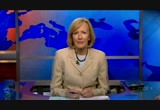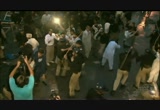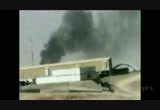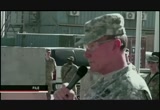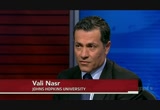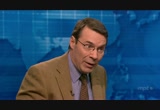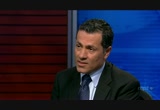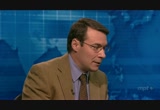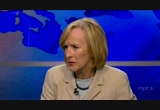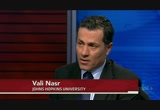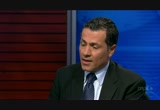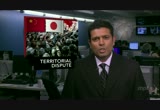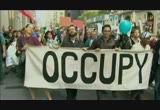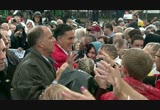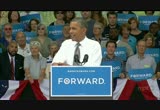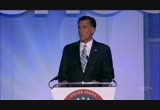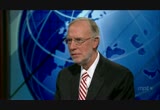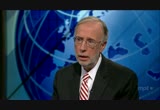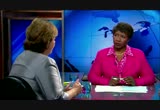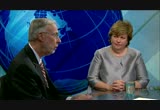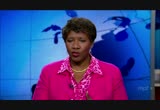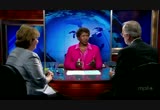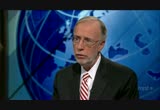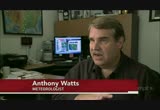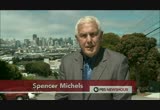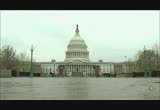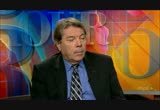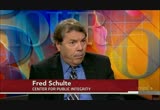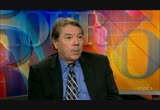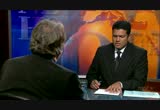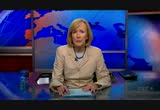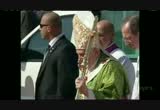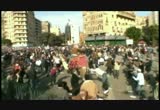tv PBS News Hour PBS September 17, 2012 6:00pm-7:00pm EDT
6:00 pm
captioning sponsored by macneil/lehrer productions >> ifill: anti-american demonstrators burned cars and threw rocks outside a u.s. military base in kabul today, as protests continued over an anti- muslim video. good evening. i'm gwen ifill. >> woodruff: and i'm judy woodruff. on the newshour tonight, we focus on the war in afghanistan, after weekend attacks killed six u.s. troops and caused $200 million worth of damage to american assets. >> ifill: then, we turn to the presidential race, where republicans are retooling their message amid sliding poll numbers. >> woodruff: spencer michels has the story of the conversion of a climate change skeptic, but that
6:01 pm
turnaround won't end the argument. >> the global warming debate centers on years of data and whether it is reliable and also on politics. >> ifill: are doctors padding bills and overcharging medicare? hari sreenivasan examines an investigation into possible fraud. that's all ahead on tonight's newshour. major funding for the pbs newshour has been provided by: moving our economy for 160 years. bnsf, the engine that connects us.
6:02 pm
intel. sponsors of tomrorow. and the william and flora hewlett foundation, working to solve social and environmental problems at home and around the world. and with the ongoing support of these institutions and foundations. and... this program was made possible by the corporation for public broadcasting. and by contributions to your pbs station from viewers like you. thank you. >> woodruff: the fury over a film that attacks the prophet mohammed spilled into more of the muslim world today, even as the middle east calmed. in several countries, including afghanistan, police used force to defend u.s. diplomatic and military sites. for the first time violent protests that eruptedded last week spread to indonesia. the world's most populous muslim nation. outside the u.s. embassy in
6:03 pm
jakarta, hundreds of people threw rocks and fire bombs and battledded with police in their fury over an anti-islamic film made in the u.s. >> there is no other way. those who insult the prophet mohammed, whoever he is, must die. >> woodruff: meanwhile in southwest asia, hundreds of pakistanis chanted "down with america" and tried to scale barriers outside the u.s. consulate in lahore. police fought back with riot batons. >> the police are carrying out atrocities against us. the world is watching. we are condemning this anti-muslim film through this protest and saying to the government that all the consulate and diplomats should be sent back to the u.s. >> woodruff: and there were similar scenes in neighboring afghanistan. where crowds set fires and lobbed rocks at a u.s. military base in kabul.
6:04 pm
>> the infidels should correct themselves. otherwise we will continue to protest. >> woodruff: the new unrest in afghanistan came as american and nato forces face deadly new attacks. the first came friday when taliban fighters disguised in u.s. army uniforms struck a major base camp bastion near the capital of helmand province. the attackers killed two u.s. marines and destroyed six fighter jets plus refueling stations and aircraft hangars. the total dollar damage is estimated at $200 million. that was followed by a new series of attacks by men wearing afghan police or army uniforms, firing on coalition troops. on saturday a gunman and an afghan militia unit killed two british troops in helmand province. on sunday in zabul province an
6:05 pm
afghan police officer killed four american service members. and last night an afghan soldier shot at a vehicle at a camp, also in helmand, wounding a foreign civilian worker. there had already been a dozen such attacks by afghan forces on foreign troops in august alone, killing 15. and that was before the explosion of outrage over the anti-islamic film. on sunday, the top-ranking u.s. military officer, joint chiefs chairman general martin dempsey, called the insider attacks a very serious threat and he strongly suggested afghan authorities must do more. he said, quote, you can't white wash it. we can't convince ourselves that we just have to work harder to get through it. something has to change. today defense secretary leon panetta weighed in while traveling in japan. >> there are serious risks that
6:06 pm
confront those who fight the war. and we will do all we can to minimize those risks, but we will not lose sight of the fundamental mission here, which is to continue to proceed to assure a peaceful transition. >> woodruff: the strains in the u.s.-afghan relationship were further aggravated by civilian deaths in a nato air strike. afghan officials said the victims were eight women and children who had gone out to gather firewood. president hamid karzai condemned the deaths. the coalition said the strike also killed as many as 45 insurgents, but it issued an apology for the civilians killed. for more on this i'm joined by john for more on this, i'm joined by john nagl, a retired army lieutenant colonel, and veteran of both iraq wars. he's commanded u.s. trainers of both iraqi and afghan forces. and vali nasr, dean of the
6:07 pm
school of advanced international studies at johns hopkins university. he served in the obama administration's state department focusing on afghanistan and pakistan. gentlemen, thank you both for being with us. vali nasr, let me start with you. general dempsey, we heard him say this is a very serious threat to the war effort. we know that secretary panetta, in addition to what we just heard him say, also called this the last gasp of a dying insurgency. who is right? >> well, the taliban have been under pressure for some time, but they are proving to be very entrepreneurial and effective in carrying out new ways of attack. they're trying to send a message to the afghan people that they still have fight in them, that they have momentum on their side. i think the fact that these attacks continue and we see more and more americans and foreign troops die and there is audacious attacks on bases, the result does worry the afghan
6:08 pm
population that the taliban has still got a lot of energy at the same time we're telling the afghan population that we are ready to leave. >> woodruff: hodo you see this? which is it? >> i think it can be both. we have put the taliban under a great deal of pressure. we are now withdrawing the surge troops that we moved mostly into the south of afghanistan. they did regain a lot of territory that had not been under allied control, but the taliban remains resilient. they continue to show planning ability. they conducted these attacks on damp bastion on the air base wearing stolen or somehow procured american army uniforms. so there are still very capable leaders and strategists. this fight is not over yet. >> woodruff: vali nasr, is it because they have a new energy, new strategic advantage on their side? is that what's going on here with the taliban? >> well, they have capability to plan and to do new things. so we went into the south in
6:09 pm
helmand and pushed them out of their territories and we declared victory. they moved that they can carry out assassinations, kill afghan officials. we can terrorize the population. they can attack u.s. bases. they have also proven the ability to infiltrate the afghan military which is what we're telling the afghan population is a really golden solution to afghanistan is this military and the taliban are already proving it to be porous. that sort of undermines our whole narrative to the afghan population. there's a great deal of ability for them to pick what fronts they want to confront us on rather than the one that we chose to fight them on in the south. >> woodruff: is that what's going on, that they know what the u.s. strategy is and basically they're trying to outsmart? >> we've been very clear on what our strategy is, that it's to increase the capability and the capacity of afghan security forces and afghan governance while bringing the skill and the capability of the taliban down to a level so that the afghans can handle it increasingly on
6:10 pm
their own. we've been clear about that. that's the strategy we're following. i think it's the right strategy. but that doesn't mean that they can't score goals on us at times. they've proven able to do so. i disagree with vali a little bit. i don't think that the problem of so-called green-on-blue killings, that is afghans in uniforms killing american soldiers, isn't so much taliban infiltration. looks like about 25% of those cases are infiltration. the others are very sadly cases of disgust or discontent with how the americans treat the afghans, in cultural friction, in cultural misunderstanding in an awful lot of these cases. >> woodruff: you mean troops or police who are serving, who were not part of the taliban but who then turn against the united states? what about that? >> well, that in itself is worrisome. in other words, if the non-taliban afghan security forces are growing
6:11 pm
anti-american, that means that the line between taliban and afghan security forces can be actually gradually diminishing. also in the eyes of the population, sometimes the way we look at this very clinically that this many are taliban and this many are not may not b apparent to the afghan population who see that the afghan security forces are acting like the way the taliban would act. >> woodruff: this all started, john nagl, about this video, this anti-islam video came out. but is that playing a significant role in what we're now seeing? >> i don't think it's playing a significant role in the attacks we saw over the weekend. it is playing obviously a very significant role in the more broad islamic uprisings against american embassies including in pakistan. i continue to think that pakistan is the root of the problem and the country we should be most concerned with in the region. afghanistan, i think, is going to be okay. the american strategy of handing off to afghans is going to succeed as long as mercury mains
6:12 pm
committed to the security of afghanistan for the long haul which i think it's going to. pakistan could go very strongly the wrong way. >> woodruff: that raises the question, vali nasr, this entire u.s. plan, as both been discussing, turning over security to the afghans, what the taliban is doing and what these insider attacks are doing though is undermining the heart of that idea. isn't it? >> well, it is. and mostly because ultimately in these kinds of conflicts you need the public on your side. you need the public to believe that you are winning and the taliban are losing. whenever that is created, that confuses the public. many people begin hedging against... people begin worrying that maybe the taliban are coming. when you have these massive protests as we are seeing in afghanistan, it also creates a sense gradually that the government may be losing control, that you have a sense of instable. we spend a lot of time in 2009
6:13 pm
to try to convince the afghan public of certain stability in the country and certain direction. that's now i think in danger. >> woodruff: it sounds like you're more worried than john nagl is about afghanistan? >> well, yes, largely because we're leaving. we have set a time line that we think is going to work like clock work by 2014. now increasing set of questions on the table. not only about the integrity of the afghan military but what is the political situation in keeps disintegrating? that stability that we're assuming is not going to be there. >> woodruff: what about all that? >> i am less concerned about the afghan government. i think that kabul is likely to hold. i think the united states will remain committed to the security of the afghan state for at least a decade to come. both political parties in the united states are firm on this point. i think that there's an american consensus behind continued advice and support to the afghan government.
6:14 pm
as long as that happens, the afghans with our help will be able to stand against the taliban. >> woodruff: all right. we will all continue to watch it. john nagl, vali nasr, we thank you both. >> thank you. >> ifill: still to come on the newshour, reshaping the message for the fall campaign; a change of heart for a global warming skeptic; and evidence of fraud in the medicare program. but first, with the other news of the day, here's hari sreenivasan. >> sreenivasan: authorities in china moved today to curb protests against japan that turned violent over the weekend. the tensions stem from japan's purchase of islands in the east china sea called the senkaku in japan and diaoyu in china disputed islands northeast of taiwan. it's believed the sea around them may contain oil and natural gas deposits. on saturday and again sunday, protesters in chinese cities attacked japanese businesses and some japanese citizens. they also clashed with riot police, who fired tear gas to disperse the crowds. today police warned against large-scale demonstrations. and some japanese companies said they will temporarily shutter plants in china. new trade disputes are brewing between the u.s. and china.
6:15 pm
beijing today filed a complaint with the world trade organization. it challenges u.s. tariffs on imported chinese steel, tires, kitchen appliances and other goods. that came as the u.s. filed its own complaint against china's auto industry. the dual actions are the latest in a series of escalating trade fights between the u.s. and china. today marked the first anniversary of the occupy grassroots movement against economic inequality. organizers planned rallies and marches in more than 30 cities worldwide. several hundred activists gathered in manhattan's financial district, where the movement began. more than 100 people were arrested. but turnout was small compared with the thousands who took to the streets last year. is won't make the changes. it's small little things. we keep on coming out. we're not going anywhere. this is a movement. it's only been a year. it's going to take many years for us to develop and figure out exactly who we are.
6:16 pm
>> sreenivasan: last fall's protests swelled to thousands, but a number of cities ultimately used police to break up the camp sites. other protesters drifted away with the onset of winter. a four-day rally on wall street has come to an end. the dow jones industrial average lost 40 points today, to close at 13,553. the nasdaq fell five points to close at 3178. chicago mayor rahm emanuel asked a state court today to end a week-long teachers' strike. that came as teachers returned to the picket lines. on sunday, their union delegates balked at approving a tentative contract. they said they needed more time to review sections on teacher evaluations and other issues. the mayor's legal filing today branded the strike illegal. the union called the lawsuit "a vindictive act." those are some of the day's major stories. now, back to gwen. >> ifill: president obama and mitt romney returned to the campaign trail in full force today, as the days dwindle to election day. >> after two weeks of slide polls, foreign policy missteps
6:17 pm
and reported in-fighting among worried republicans, mitt romney moved to get his campaign back on track today. first up, a trip to los angeles to speak to a hispanic business group. >> many hispanics have sacrificed greatly to help build our country and our economy. and to leave for their children a brighter future. today those sacrifices are being put at risk by a president who just can't stop spending. >> ifill: romney campaign officials said their candidate plans to reinforce his message by offering specifics that will show he is the better choice. nationally, the race remains close. but the president has recently gained an edge in key battle ground states. he campaigned today in ohio where the most recent poll has him ahead by seven points. >> hello, cincinatti! ifill: the president used the lever of incumbency to launch a two-pronged attack today, chastising china for subsidizing its auto industry. >> these are subsidies that
6:18 pm
directly harm working men and women on the assembly lines in ohio and michigan and across the midwest. >> ifill: and using his campaign platform to accuse romney of being soft on trade to china. >> i understand my opponent has been running around ohio claiming... don't boo. vote. vote. but he's been running around ohio claiming he's going to roll up his shreves. he's going to take the fight to china. now, you can't stand up to china. when all you've done is sent them our jobs. you can talk a good game. but i like to walk the walk not just talk the talk. >> ifill: the white house says more than 850,000 jobs in the state are connected to the auto
6:19 pm
industry. romney has released a series of ads focused on the economy. he accused the president of being soft on trade. >> my plan is to help the middle class. the trade has to work for america. that means crack down on cheaters like china. >> now the president may think that announcing new trade lawsuits less than two months before the election will distract from his record. but american businesses and workers struggling in an uneven playing field know better. if you had known that all it took to get him to take action was to run an ad citing an inaction on china's cheating, it would have run one a long time ago. >> ifill: behind the scenes the romney campaign was trying to beat back growing perceptions that theirs is a campaign in crisis. in one widely read article in politico, unnamed advisors and romney supporters were quoted worrying allowed by romney's fortunes and especially about the role of senior advisor stewart stevens. a growing number of conservatives are blaming stevens for advocating a
6:20 pm
campaign of caution, politico reported. one that puts all the em fa not on how good knee could be but how bad obama is. romney campaign officials, however, insist they are on course. the candidates' travel schedules this week tell the story as the campaign enters its final 50 days. president obama heads to florida and virginia, and romney heads once again to florida. we're joined by susan page and dan balz, chief correspondent for the "washington post." susan, we have been all consuming this daily diet of polls especially from the battle ground states. presumably the romney campaign and the obama campaign have been doing the same thing. do they interpret those numbers the same way we have been? >> well, i think that both campaigns see a small bump for president obama coming out of the conventions, although it's going a little narrower. in these three most critical battle ground states -- ohio, florida and virginia -- you do
6:21 pm
see obama having a slight advantage, a slightly bigger advantage than he had before. i think this is very worrisome to the romney folks and quite encouraging to the obama side. >> ifill: what do the romney people say about all that? >> they say a couple of things. they think that the bounce was overinterpretted that the president got after his convention. late last week they expected these numbers to tighten up. some have tightened up. i think their hope and expectation is that some of that will begin to happen in these battle ground states as well as nationally. they also have a much different interpretation of last week's events. i mean their view is this was a much worse week for the president than it was for mitt romney though mitt romney got a lot of criticism. they look at two things. one the federal reserve decision which they say ratifies the idea that this economy is still weak, still not coming around, needs a lot of help. and that the turmoil in the middle east is a reflection on the president and his policies. >> ifill: threw a new poll out tonight that shows that a lot of
6:22 pm
americans don't agree with that. they thought the president handled the turmoil in the middle east better than mitt romney did last week. >> it got the potential to be a big problem for the administration if we have serious issues in the middle east and a debate over the wisdom of president obama's policies toward the arab spring and elsewhere. on the other hand, i think what americans as voters care most about when they look at foreign policy is the sense of leadership. is this somebody who is competent and thoughtful and somebody who i can trust in a crisis? i didn't predict today would come over the next four years? why i think the fact that governor romney got out there pretty fast with very critical words as the violence was just starting in cairo and bengs ay, raised some questions about the tone of his remarks. it robbed him of the chance to really focus the debate on the wisdom of u.s. policy in the region. >> ifill: governor romney today decides he's going to get back on course. they say they've never been off course. but say they are. one of the things they're going
6:23 pm
to do is be specific. there's a hunger for specifics from the american people. that's why we probably saw both of them talking about trade with china. but what does specificity really do in a case like this just 50 days out some. >> one thing for gf nor romney is to fill in some obvious gaps about his tax and budget policies. he's been asked questions repeatedly about how he would essentially make his mathematics, his math add up. and he hasn't done that yet. i think that until he does that, he's going to continue to get those kinds of questions. if he hasn't done it by the debates, he will certainly get it in the debates. that's a big stage for him to try to deal with those questions. the other i think is the question of what does a romney presidency really look like? is it a big and bold conservative agenda, based on what many of the republican governors and paul ryan and the house republicans have been doing since 2010 or is it something more modest and incremental? he hasn't fully answered that
6:24 pm
question either. >> ifill: it doesn't seem like these are both the same thing. you have to show the big picture question with the leadership issue and the small questions with filling in the details. hodo you do both of those? >> i think it shows a change in the basic assumption of the race on the part of the romney folks. they had been run ago race that would be a referendum on president obama in which president obama would be found wanting. therefore his challenger would win. that has not i think been sufficient. it's become more of a choice election. that reflects a success by the obama folks in raising questions about governor romney. so he is now forced to make a stronger case for himself. and the problem with coming out with specifics, whether it's on economic policy or foreign policy, is that it gives more for your critics to pick at and criticize as well as giving americans a better sense of what you do in office. >> ifill: so we can assume that the people in chicago, the obama folks are just kicked back, happy about this, got it in the bag, right? >> not quite. .
6:25 pm
although i think they feel... clearly they feel better than they did before the conventions. i think their belief is they have now a more solid lead. however small it may be. it is a more solid lead than they had going into the conventions. i think they also think that this race will tighten further. they know the pitfalls ahead with the debates. but they also have an enormous amount of confidence in their ground game compared to where they think the romney campaign is. >> ifill: it's also impossible now to pick up a newspaper article or read anything about politics right now and not hear about the grumbling, the in-fighting and the romney campaign. is that what you're reporting is showing as well, this political story we've all been consuming that it's that bad? >> this is extraordinary. this has never happened except in all the other campaigns. in history. when things get tough, you hear about the back biting and second-guessing that goes on any every campaign, even in successful campaigns but when campaigns are going well you don't hear about it. when i talk to voters, when we
6:26 pm
do our polling, nobody raises the issue, gee, what strategist is really devising these ads for this campaign? they care about what's my measure of this candidate? what can he do for me and my family? one problem i think i agree with dan that the obama people feel a little better. but the fact is there continues to be questions and disappointments with the first term of president obama that makes it a race. makes it a close contest, we expect, going forward. >> ifill: i get what you say, that people aren't saying who is this stevens' guy and why is he ruining my life? but if they are responsible for having presented this candidate to the american public at a time when he has a platform at his convention and that didn't proceed as they had hoped, is it significant that there is a disagreement about vision within the campaign? >> as susan says, this does happen in every campaign. i talked with mark mackinnon who was involved in both the bush campaigns and he talked
6:27 pm
about september 2000 which he remembered at black september. we couldn't do anything right. everybody wanted us to be fired, et cetera, et cetera. on the other hand, campaigns ultimately reflect the candidate. strategists can do what they do. some strategists are better than others. strategists make mistakes and strategists can be brilliant but ultimately the issue of how governor romney presents himself to the american people is something that governor romney, in consultation with his advisors, has to find that sweet spot. so there can be criticism, as there always is in a campaign that's under during etion, about should you have done something that you didn't do or did you do do something that you shouldn't have? but for voters, i think, the real test is, does this campaign and this candidate convince me that i should be voting for him. >> ifill: that's why the stakes are going up for these debates. >> oh, yeah. it's the final opportunity, barring some unexpected event outside everyone's control, it's the final opportunity for president obama either to seal
6:28 pm
the deal with voters or for governor romney to change the trajectory of the race as it's on right now. >> and the first debate i think is by far the most important debate. if governor romney has a really good night and the president doesn't have such a good night, people will be talking about this race in a much different way right after that. if he doesn't have a particularly good night, the audience for those second and third presidential debates may not be as big... there's not a lot of people left to persuade anyway. so that first debate becomes more significant. >> ifill: no pressure, jim leer, right? dan balz, susan page, thank you so much. >> thank you. in one clip romney said it's not his job to win over the 47% of voters who back the president because they don't pay taxes and are, quote, depend ept on government. the obama campaign denounced the remarks as shocking.
6:29 pm
>> woodruff: now, to the debate over the magnitude of climate change, its impact, and the human role in it. typically the battle plays out among prominent climate scientists and a vocal group of skeptics. but one skeptic's recent public conversion is adding new fuel to that fire, and sparking criticism from both sides. newshour correspondent spencer michels has the story. >> which one is this? reporter: this is richard muller and his daugherty elizabeth, a mathematician are not exactly house holes names. in the world of climate change where most scientists and a match smaller group of skeptics remain bitterly divided over their assessment of what's happening to the planet, richard muller has long been on the side of those who deny climate change is happening. when he published an op-ed in the ne "new york times" last moh saying he was no longer a skeptic, it captured national attention and sparked angry
6:30 pm
reaction on both sides of the climate fence perhaps most disturbing to some of his former allies was this conclusion. >> in our world, we attribute the warming from 175 to the present... 1753, to the present exclusively to humans not mostly. >> reporter: even those skeptics who accept that the climate is changing attribute it to natural cycles, but muller even claimed his study was more conclusive in that regard than any that came before. >> we really are in some sense coming out with a stronger conclusion than the prior group had come out with. >> reporter: working out of their house in berkeley where muller is a physics professor at the university of california, the mullers formed the berkeley earth surface temperature project. using funds partly supplied by the koch brothers who have also funded skeptical organizations like the hartland institute, the mullers had long analyzed temperature data others had
6:31 pm
collected. but for years they said they hadn't trusted that data. >> i think many of the people working on this had convinced themselves that global warming was real and had lost some of their objectivity. >> reporter: but in their op-ed, the mullers said that their latest research showed that the data from other climate change scientists was by and large correct. >> we used all of the data, essentially ought of the data, five times more than any other group had done. after having done all of that, we determined that the previous studies on global warming had been about right. there was global warming of about 1 degree celsius in the past 50 years. that was a big surprise to us. >> reporter: the conclusion about a warming climate due to human action matched what many other climate change believers have been saying. including william cullen, a senior scientist at lawrence-berkeley laboratory. he acknowledges that natural warming and cooling periods have occurred for eons, but the warming occurring now is off
6:32 pm
rhythm. >> what we're seeing now is occurring much faster rather than happening over tens of thousands of years, we're seeing very rapid change occurring on just a time scale of a single century. this time line is showing how the temperature all over the globe has changed since the beginning of the 20th century. look at how warm california has gotten, four or five degrees hotter than historical climate. >> reporter: and he concludes that man is a big contributor. >> what man has been doing is enhancing the greenhouse effect by taking carbon dioxide that was formed over the last half a billion years and releasing that carbon dioxide which is a greenhouse gas back into the err's atmosphere. >> reporter: yet many of those believers were annoyed that muller's conversion got more attention in the media than their reports have gotten in the past. they dismissed him as being publicity hungry and adding nothing new to the debate.
6:33 pm
climate modeler and british green party member connelly called muller's study rubbish saying they hadn't added any knowledge to what had been done before. skeptics were even more dismissive of muller's work. judith curry, professor of earth sciences at georgia tech, who suspects natural variability accounts for climate change, not human-produced co-2 said muller's analysis is way over simplistic, notate a all convincing. >> and it is something that we invented here. >> reporter: even former ally anthony watts thinks muller got it wrong. watts works five hours for muller in chico, california. there he runs a company supplying data and display systems to television weather forecasters in private... and private individuals. he was trained as a broadcast meteorologist though he has authored some papers with academic researchers. his blog, watts-up-with-that, bills itself as the world's most viewed sight on global warming
6:34 pm
and climate change. watts believes all climate warming data, muller's included, is off because weather stations where temperatures are recorded have soaked up heat from their surroundings. >> a brick that's been out in the summer tun, you stand next to it at night, you can feel the heat radiating off it. that's a heat sink effect. we have more freeways, you know, more airports we've got more buildings. yes, we have some global warming. it's clear. the temperature has gone up in the last 100 years but what percentage of that is from carbon dioxide and what percentage of that is from the changes in the local and measurement. >> reporter: he also thinks believers have a hidden agenda. >> global warming has become a business in its own right. there are whole divisions of universities that are set up to study this factor. so there's lots of money involved. so i think that there's a tendency to want to keep going and not really look at what might be different it's a charge
6:35 pm
climate change believers say is totally false. but many do agree with watts' criticism of muller for presenting his report in a newspaper rather than in a scientific journal. >> he has not succeeded in terms of how science views, you know, a successful his papers have not passed peer review. in science a peer review means you give talks to the public. you send your papers to colleagues around the world. that's what i did after i wrote the op-ed, i put all the papers available on the web. >> reporter: the fight over climate change is anything but academic. whether the politicians listen to the 97% of scientists who say that it is real or they pay attention to the vocal community of skeptics will determine to a large extent what regulations and what laws get passed. neither presidential candidate is talking about climate change, but in congress it's a different story.
6:36 pm
74% of u.s. senate republicans publicly question the science of global warming. including oklahoma senator james in hoff who thinks it's a hoax. >> those people who really believe that world is coming to an end because of global warming and that's all due to man made gases, we call those people alarmists. >> reporter: polls show more than half the republicans in the house are global warming skeptics. many were elected with the tea party wave during the 2010 election. in 2011, a republican-dominated house committee defeated an amendment offered by democrats simply acknowledging warming of the earth. stanford university professor of communication and political science, john crossnick who has polling on climate change for 50 years, thinks the skeptics are winning in washington. >> the voices of skeptics on climate change are very loud in this country and particularly effective in washington at the
6:37 pm
moment. but they're a very, very small group. less than 10% of americans are confidently skeptical about climate change at the moment. yet that group expresses its points of view so often and so vociferously that i believe they have washington confused at the moment. >> reporter: he says his polls, taken nationwide, show many americans still worry about climate change. >> from the very beginning, we were surprised that the large majorities and in some cases huge majorities of americans express what you might call green opinions on the issue. they said they thought the planet had been gradually warming over the last 100 years. they thought human activity was responsible for it. and they supported a variety of government ax because they saw it as a threat. >> reporter: he says that neither storms nor the recent drought that has been affecting the midwest affect his poll numbers. which have remained steady for more than a decade. however, other polls showed a significant decline in the number of americans saying there is solid evidence global warming is occurring.
6:38 pm
a drop of 20% between 2008 and 2010 when belief started rising again. annal pos conducted by gallup and other news organizations suggest the issue ranks lower on voters' top priorities. watts says polls can be manipulated by how the question is asked. he's worried that those who believe in man made climate change will have their way in washington. >> some of the issues have been oversold. they've been oversold because they allow for more regulation to take place. so the people that like more regulation use the global warming as a tool as a means to an end. so as a result we might be getting more regulation and more taxes that really aren't rooted in science but more in politics. >> reporter: but muller and others think action is exactly what is needed. >> i expect we will have considerable warming. depending on the growth of china between 20 years and 50 years from now we'll be experiencing weather that's warmer than homo
6:39 pm
sapiens ever experienced. i tend to think that's going to be bad. we should do something about it. we can do something about it. >> reporter: doing something about global warming raises a host of other issues including new regulations and the costs of reducing greenhouse gases. issues that inflame an already contentious debate. >> woodruff: on-line, spencer talks to climate skeptic >> woodruff: on our web site, spencer michels talks to climate skeptic anthony watts, a blogger and former meteorologist, about the politicization of global warming. >> ifill: next, a new investigation finds doctors are increasingly billing medicare at higher rates, leading to questions about the possibility of fraud, error, and sicker patients. hari sreenivasan has more on this story. >> the new report says hundreds of thousands of bills from doctors, hospitals and medical professionals over a decade. doctors bill the government for
6:40 pm
a medicare patient's visit by using one of five codes. each one at a different rate. the investigation found doctors are increasingly charging medicare at the higher rates for routine visits, a practice known as up-coding. the center for public integrity found those charges and others may have added at least $11 billion to the government's tab over ten years. even though many of the higher billings seemed questionable. and the report comes amid greater political attention on lowering medicare costs. the senior reporter with the center for public integrity, an investigative reporting association. he joins me now. thanks for being with us. so you had to sue to get access to this data in the first place. what made you want to go there? >> well, because they wouldn't give it to us. but we were, you know, interested in looking at how medicare billing has changed over the years. this is the database that had millions and millions of individual billings by doctors. it was sort of the holy grail at looking at medicare billing.
6:41 pm
>> i tried to explain upcoding a little bit. when we get a bill from our doctor we don't know that there are five different at goers on how our visit was billed. >> that has been a mystery to patients for years. nobody looks at those numbers. they don't mean anything to anybody. but this fact they're representative of the amount of time that the doctor took with caring for you and the degree of effort that was put into the treatment. and they're correspondingly. what we saw over time was that the coding was just going up like this, sort of like an airplane taking off. it appears that there was no real explanation for it. >> sreenivasan: more and more of the visits were categorized at the highest level. how do you determine that kind of fine line between fraud, maybe just billing error, and legitimate efficiency? >> well, the government says that when you do these five codes you're supposed to have something of a bol curve. so obviously some patients are sicker than others so they take more time and effort. when you have doctors who, every
6:42 pm
patient that they see is at the highest possible level, that's really suggestive of some abuse of the system. >> sreenivasan: the american medical association in your own story said, hey, listen, the folks who are focused on medicare are seeing patients who might be sicker and take longer to treat. >> a lot of doctors did say that. but the data really don't show that. i mean what we saw in the billing data was the reasons that people were coming to see the doctor didn't change much over the decade. we also saw that the ages, the average age of the patients weren't changing. there's not much academic research that we could find to suggest that, in fact, patients are sicker and older. >> sreenivasan: there's also the fascinating bit in your story about electronic record keeping. the government is to ask doctors to put this into their practices. you're saying that this actually could be driving to higher billing rates. how is that? >> right. well, when you write down everything by hand, i mean this is what many doctors told you, you may forget a few things.
6:43 pm
when you have a computer it never forgets. it collects everything. used correctly, you could see an increase in the coding. an increasing in the billing because the computer's capturing more things. but what you can also do with the push of a button you create a complete medical file that moves information from previous visits into if current visit and then as a result of that, jacks up the coding level even though there was no additional service provided. >> sreenivasan: like copy and paste one document to another. >> it's exactly copy and paste. sreenivasan: it makes that visit more expensive. >> yes. sreenivasan: i ask a couple of doctors after they read the report, listen, some of the software i actually buy advertises it will give me better revenue, that it will hole-me code better. is that pretty commonplace? >> absolutely. if you look on the internet, i mean, you can look up. there's about a thousand different companies that are selling electronic billing software. most of them in fact do make a pitch to doctors. if you buy this equipment, it
6:44 pm
will increase your revenues. the way it increases your revenues is through higher coding. >> how hard is it to clamp down? in one section in your story, it said it might actually government more to investigate these cases than they would recoup. perhaps they're not investigating as aggressively as even you are. >> that's what the government is saying. they're saying that it might cost them $50 to actually go back into a patient's file and read through it, pay someone to do that and decide whether the coding was right and that the average upcoding that they might see would only be $45. therefore they're losing money. i mean if that's the position you want to take, then, i mean, i don't know. >> sreenivasan: doctors roo are also saying listen i'm underpaid. whether this is a silent protest or not. whether they're actively or willingly doing this or not. they say if the top end of how i bill a patient is $140, you have to recognize that my time is worth more than this. i'm not going to bill it at $20. >> a lot of people would agree that the doctor has got a point
6:45 pm
there. who do you get to come to your house or do anything or see for $140 nowadays? i mean, i think that they make an argument that they've been underpaid. they also make an argument that they've been undercoding over the years because they're fearful that the government is going to swoop in and accuse them of wrongdoing. now they've got electronic health records, it's assisting them in getting what they're due. in the past they've been leaving money on the table. now they're only getting their just due. we'll have to see if that's the case. >> sreenivasan: there's also somewhat of a veiled threat saying you keep up these audits and there will be more doctors that will dump medicare patients because this isn't going to work. >> that's not too subtle a threat. i mean we've seen that in letters, you know, in california when the government announced it would start stepping up audits because it was seeing a lot of coding at the higher levels. they got a letter back from the california medical association that said... did say that.
6:46 pm
they said that, of course we don't want any doctors cheating the system. but when you step up these audits, requiring doctors to send all this documentation in, it puts a burden upon them. if you put too much of a burden on doctors they're going to say we're not going to take any more medicare patients. >> sreenivasan: thanks so much for your time. >> thank you. >> woodruff: finally tonight, we come back to the unrest in the muslim and arab world. pope benedict wrapped up a three-day visit to lebanon today, a long-planned trip that was overshadowed by the anti- american protests in the middle east. but the flare-up in violence was just the latest in a series of events and conflicts that have many christians in the middle east uncertain about their future. ray suarez has the story. suarez: thousands turned out throughout lebanon to get a glimpse of the leader of the roman catholic church.
6:47 pm
while many focused on the pageantry of the visit, the region's problems weren't far away. in tripoli lebanon, one person was killed friday over protests of an anti-islamic film. at least 16 people were killed in sectarian strife in the city, more than 100 injured. over the border in syria, civil war rages on. according to activists, more than 24,000 people have been killed in conflict. nearly a quarter million have become refugees. as strict interpretations of islam have become more widespread across the middle east, christians have continued to leave. while speaking in beirut sunday, the pontiff made a special call for peace and coexistence while speaking to thousands at an open air mass. >> you are very well aware of the tragedy of conflict and violence that leads to so much suffering. unfortunately the sound of arms can still be heard in addition to the cry of widows and/or
6:48 pm
fans. violence and hatred are sweeping over life and women and children are the first victims. why so much horror? why so many dead? i call on the international community. i call on arab countries to propose all possible solutions. that respect the dignity, right and religion of each person. >> suarez: once the pope was gone, it was back to business as usual. the militant group hezbollah which had recently supported the pontiff's trip called for a week of proceed tees over the controversial film which has much of the muslim world up in arms. the leader personally led protests today. this christian boutique owner told the newshour that events like these weigh heavily on the minds of those in her community. >> the life of christians in lebanon. i find that they're always afraid with everything that is happening with the islamists. >> suarez: mary jane deed head of the africa and middle east division of the library of congress and an egyptian-born
6:49 pm
christian says the long-term pressures on middle eastern christians have steadily gotten worse. >> there have been wars. there have been civil strife. there have been economic and political development that have undermined the region. certainly today, they are dwindling. >> suarez: the causes are many. the war in iraq, the tumult unleashed in the arab spring, even the education and foreign contacts that have made it easier for arab christianes to emigrate. in iraq, syria and egypt, long-time protectors, arab strongmen can't protect christians as they once could. mary jane deeds. >> the christian communities did not consider it a threat to existing regimes so they were put in a way under the wings of some of those governments.
6:50 pm
because they saw them as an educated minority. in the case of egypt, it was a two-sided sword, if you want. when it served the interest of the government, yes. egypt's government would protect the christians but when the government needed to appear... appeal to more radical muslim feelings, then it allowed cop tick buildings, areas to be ransacked, attacked by radical islamists. >> suarez: the numbers certainly are not positive. christians today make up about 5% of the entire middle eastern population. that's down from about 20% a century ago. according to some estimates, the total population of christians in the middle east, roughly 12 million, could be cut in half over the next eight years.
6:51 pm
in egypt, the country with the largest number of christians in the middle east, an estimated 93,000 coptics left in 2011 alone as egyptian president hosni mubarak fell from power and members of their community were attacked. some cops don't have much hope for the future. >> we have much oppressed. we have lost our sons and they were not guilty. why were they killed? why have the mothers been bereaved. >> suarez: like this christian claire i can believe coexistence is possible. >> the way that people are thinking should be changed. i want to tell everybody that the main target is not only causing rifts between muslims and christians but also seeks to entice our unity. those people are hard-line thoughts should think big about the future and change. >> suarez: in israel the numbers of christians are actually rising while in gaza and the west bank, home to the birth place of jesus, numbers are trending downward.
6:52 pm
as the area copes with extremism and financial hardships and limited physical movement. in iraq after the fall of saddam hussein, an estimated two-thirds of 1.5 million christians led their homes and churches. priests have been murdered, churches attacked, some christians moved to safety in northern iraq. others left the country. in syria, the president has long had the reputation of protecting the ancient christian communities as restless muslims radicalize, christians felt exposed. >> only the secular government can preserve the existence of christians in the middle east. after all, during the government of assad or the other government, we lived in syria with religious freedom. we have our freedom to worship and to build the churches.
6:53 pm
>> suarez: syrian christians are exceptionally vul vulnerable. >> the christians are caught between the rock and the hard place because on the one hand there's the government that was at least protecting them to some extent. that is under siege. on the other hand, the syrian christians are afraid. the radical islamist group will undermine their positions, their privileges and even their security. it is difficult for them then to support the opposition. >> suarez: christians in lebanon fare better in many ways than their counterparts in other countries. the countries head of state by law must be a christian. the muslims and christians have hundreds of years of relatively peaceful coexistence. the outcome in syria's civil war, a country for assad for
6:54 pm
seer's christians is still unknown. can you imagine a day where some of the great historic places of christianity will simply have furor no christians? >> there are no more christians in algeria, in tunisia, in libya. where there was a majority of christians 700, 800 years ago. they're gone. there's no one. so it is not difficult to imagine that in the rest of the region that will also happen as more christians are immigrating. they're leaching. they're going to australia. they're going to the states. they're going to europe. >> suarez: meaning the current instability carries the risk of not just further shrinking christianity in the religion's birth place but bringing its disappearance that much closer. >> woodruff: you can see a slide show of images from the pope's visit to lebanon on our website. find that on the rundown.
6:55 pm
>> ifill: again, the major developments of the day. the fury over a film that attacks the prophet mohammed spilled into more of the muslim world, including afghanistan, even as the middle east calmed. and president obama announced a new trade action against chinese imports, while mitt romney made a fresh appeal for hispanic support. it's constitution day, and we're celebrating online. hari sreenivasan explains. >> sreenivasan: margaret warner hosted a conversation with former supreme court justice david souter in new hampshire. you can watch excerpts and read margaret's blog. there was a surprise delivery at the national zoo sunday: a new giant panda cub. and you can watch a video of the birth. find that on the rundown. all that and more is on our web site, newshour.pbs.org. gwen? >> ifill: and that's the newshour for tonight. i'm gwen ifill. >> woodruff: and i'm judy woodruff. we'll see you online, and again here tomorrow evening. thank you, and good night. major funding for the pbs
6:56 pm
newshour has been provided by: >> bnsf railway. and with the ongoing support of these institutions and foundations. and... this program was made possible by the corporation for public broadcasting. and by contributions to your pbs station from viewers like you. thank you. captioning sponsored by macneil/lehrer productions captioned by media access group at wgbh access.wgbh.org
277 Views
IN COLLECTIONS
WMPT (PBS) Television Archive
Television Archive  Television Archive News Search Service
Television Archive News Search Service 
Uploaded by TV Archive on

 Live Music Archive
Live Music Archive Librivox Free Audio
Librivox Free Audio Metropolitan Museum
Metropolitan Museum Cleveland Museum of Art
Cleveland Museum of Art Internet Arcade
Internet Arcade Console Living Room
Console Living Room Books to Borrow
Books to Borrow Open Library
Open Library TV News
TV News Understanding 9/11
Understanding 9/11

